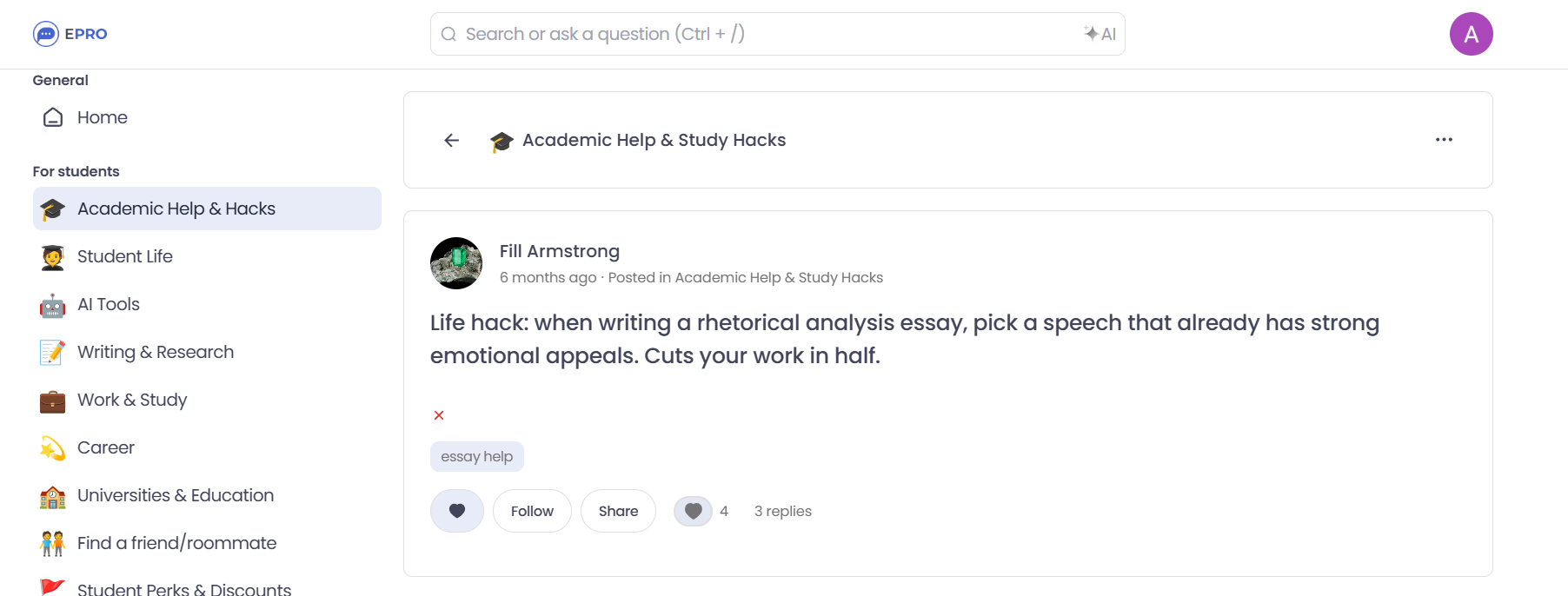A rhetorical analysis essay is part of academic writing that studies how language and techniques influence an audience. It examines the effectiveness of these methods instead of summarizing the contents of the text. Here you would study the strategies that the author uses behind the text rather than its surface meaning.
This article explains the essential concepts of a rhetorical analysis paper and provides a clear framework for approaching the assignment. If you're a student looking for structured support from a writer, know that EssayPro can always take over your tasks!
💬 Rhetorical Analysis Essay Trouble?
Jump into a discussion and find hacks that 100% work!
Join EssayPro Community and get advice from peers who've navigated the same concerns. 👇

What Is a Rhetorical Analysis Essay?
Rhetorical analysis essay is a type of essay that examines what the author's purpose is and how an author constructs their main argument and communicates it with a reader. The purpose of the assignment is not to decide whether or not you support the ideas present in the text but to analyze the rhetorical techniques, such as ethos appeals, pathos, and logos appeals. Your conclusion will answer the question of whether the author's rhetorical devices were effective or not in communication with the intended audience.
Important Elements of Rhetorical Analysis
Writing a rhetorical analysis essay requires attention to a text's structure and the author's decisions. It also examines how those decisions influence readers and how arguments gain strength through context and appeals.
Appeals
Appeals are the methods writers use to engage with their audience. They may rely on logic, credibility, or emotion.
Logos
Logos is the appeal to reason. It shows that an argument has more behind it than just an opinion. Writers use it when they want readers to see that claims are backed up with proof. The most common ways to build logos include:
- Facts and statistics
- Research findings
- Clear, concrete examples
Take a scientific article that presents controlled study results. The data is measurable and the argument follows a traceable line of thought. That kind of structure makes the claim feel solid and dependable.
Ethos
Ethos points to credibility. It lets readers know the author or speaker is someone worth listening to. Authority shows up in different forms, and it can be established through:
- Academic or professional credentials
- Firsthand experience with the subject
- A fair and responsible tone
Picture a lawyer writing about legal reform. Their expertise can add credibility to every claim they make. Readers will trust someone with proven knowledge.
Pathos
Pathos is the appeal to emotion. It can drive people to care or act by focusing on how a message makes them feel. Writers and speakers often use:
- Personal stories
- Descriptive, vivid language
- Images or details that spark strong reactions
Take a humanitarian campaign. Let's say it describes families displaced by a natural disaster. This story will elicit compassion and create a sense of urgency, too. When used with care, pathos connects arguments to lived experiences. That connection makes ideas harder to ignore and easier to remember.
Text and Context
Each piece of writing has two sides you need to look at: the text and the context. Here's what each of them means:
- Text is the actual material.
- Context is the situation that surrounds those words, including purpose, audience, and setting.
Take a court ruling as an example. The judge's opinion would be the text. It's written in precise language and grounded in legal precedent. The context is the courtroom: a place where lawyers and judges, who know how to interpret every phrase, read this opinion.
Imagine the same ruling reprinted in a newspaper. The effect won't be the same because someone who's not familiar with the field might misinterpret it. Even worse, they might entirely disregard its importance. This happens simply because the technical text wasn't meant for them. If you start analyzing the text without its context (or vice versa), you might not fully understand it.
Claims, Supports, and Warrants
Arguments hold together through structure. This structure is built with three elements: claims, supports, and warrants. Each part serves a specific role. The absence of one weakens the whole text.
- Claim: the main assertion a writer wants to prove. Example: "Access to education reduces inequality."
- Support: the reasoning or evidence that gives the claim weight. Example: "Data shows that higher education improves employment opportunities." A claim without support is little more than a statement of opinion.
- Warrant: the logical link that ties claim and support together. Example: "Improved employment opportunities reduce economic disparities."
It will be easier to test the argument's strength if you break it down into these three parts. Is the claim weak? The argument falters at the start. If support is thin, you can't convince the reader. A missing warrant breaks the connection between the evidence and the claim. These elements reveal both the quality of reasoning and the persuasiveness of the text.


The Five Parts of a Rhetorical Situation
A piece of writing consists of five rhetorical situations. These conditions determine how the audience receives the message. The table below will describe these concepts and the relationship between them in detail:
Rhetorical Analysis Essay Outline
The main parts of any good rhetorical analysis essay are:
- A rhetorical analysis essay intro
- Body paragraphs where analysis happens
- Conclusion for wrapping up your rhetorical analysis essay
Let's go through each part and see what they must include:
I. Introduction
- Hook: Begin with a short statement about the text you will analyze.
- Background: Give context and explain the situation in which the text was created.
- Thesis Statement: State your main point.
II. Body Paragraphs
A. First Rhetorical Strategy
- Name the strategy.
- Add a direct example from the text (direct or paraphrased).
- Explain how this example affects the audience.
B. Second Rhetorical Strategy
- Introduce another strategy.
- Provide evidence from the text.
- Show how it shapes the audience's response and supports the overall message.
C. Third Rhetorical Strategy (optional)
- Present a third technique if it is relevant.
- Include an example.
- Explain how it connects back to your thesis and makes the argument stronger.
III. Conclusion
- Restate Thesis: Summarize your main claim.
- Key Takeaways: Point out the most effective strategies.
- Final Thought: End with a reflection on the text's impact.
This outline works great for a rhetorical analysis. But if you're tackling an analytical essay, you'll need a different setup. Lucky for you, our analytical essay writing service can help.
How to Write a Rhetorical Analysis Essay Step by Step
It's time to start writing since you already know how to build a rhetorical analysis essay structure. This type of writing (just like any other) works best when you approach it step by step. Here's the process of rhetorical analysis: examine the text -> craft the Introduction -> develop the body -> write the conclusion.
1. Examining the Text
Start with a close reading of the text. You will need to go beyond a single scan: read carefully, and after that, go back to look closely at the details that you might have missed at first. At this point, your primary focus must be on the author's language and tone. Then, you start paying attention to the overall structure of the text. Questions that guide this process are:
- What goal is the author trying to accomplish?
- Who makes up the intended audience?
- Which strategies appear most prominently in the argument?
Let's consider, for example, a presidential speech. Mark moments where the speaker appeals to national identity or collective responsibility. Noting these choices makes it possible to see how specific techniques "drive" reception. This step will give you the basis for later analysis because you need to identify strategies to determine how they work.
2. Crafting the Introduction for a Rhetorical Analysis Essay
An introduction frames the entire analysis, so clarity and precision are of utmost importance here. Begin by identifying the text under study: include the author, title, and the circumstances of its creation. Once you've set that foundation, you will need to focus on the purpose and how the author pursues it. You also need to identify your essay's scope. Build a strong conclusion by:
Example: In "I Have a Dream," Martin Luther King Jr. uses emotional language and ethical authority to make a call for racial justice. These appeals increase his speech's ability to prompt group action.
3. Developing the Body of a Rhetorical Analysis Essay
The analysis happens in the body paragraphs. Each part of the body should examine a single strategy or device. Then, each of them must be supported by specific evidence. A clear topic sentence that names the strategy, must open every paragraph. Then, you should provide specific examples and follow them up with explanations that connect them to the purpose. To keep the body organized:
- Dedicate one paragraph to each major appeal.
- Use quotations or precise paraphrases as evidence.
- Explain the function of each example instead of restating it.
- Link each point back to your thesis.
Consider King's use of ethos in "I Have a Dream." Credibility is established by appealing to foundational principles through references to the Declaration of Independence. After this, you could use another paragraph to note how the imagery of "the flames of withering injustice" heightens the sense of urgency.
4. Writing the Conclusion of a Rhetorical Analysis Essay
A conclusion draws the analysis together and reinforces the thesis. Handle this part by:
- Restating the thesis in different words
- Reminding readers of the author's purpose
- Pointing out the most effective rhetorical strategies
- Noting how those strategies shaped the audience's response
- Showing how the strategies supported the main argument
- Mentioning any patterns that stood out in the text
- Reflecting on the continued relevance
Example: By combining logical reasoning with appeals to shared values, the author builds a persuasive argument that continues to hold significance today.
Make sure you create a references list at the end according to the MLA or APA essay format (whichever has been requested by your instructor).
Rhetorical Analysis Essay Example
It's always better to have a real-life rhetorical analysis example. Check out our sample created by our writers.
Tips for Writing a Rhetorical Analysis Essay
To make a rhetorical analysis essay, you need attention to detail. That's why you might need a few practical tips to make your writing more accurate:
- Read the text more than once: By the second or the third pass, you'll notice the less obvious details.
- Notice shifts in tone: The strategy often shifts with it.
- Identify repeated words or ideas: Something that keeps showing up is probably central to the message.
- Note how the author addresses the audience: Some texts speak directly through "you" or "we." Others keep it indirect. Both choices tell you how persuasion is being shaped.
- Draft your thesis after gathering examples: Collect evidence first, then write the thesis. This ensures your main claim reflects the text rather than assumptions.
- Connect back to the author's purpose: Each quotation or paraphrase should link to the author's goal.
If you need tips for other assignments, EssayPro will gladly help you. Check out our dissertation service.
Final Thoughts
Let's give the most important points a final review: a rhetorical analysis essay studies how authors persuade through rhetorical techniques; logos, ethos, and pathos remain central rhetorical appeals, but structure and context influence meaning just as much; careful reading helps identify shifts in tone and repeated themes; arguments are built on claims, supports, and warrants.
And for anyone looking to buy essay, know that EssayPro’s professionals can easily apply rhetorical strategies and present arguments with confidence for you!
FAQ
How to Start a Rhetorical Analysis Essay?
Start writing by following these simple steps:
- Identify the key details of the text.
- Give the reader some background information.
- Form a working thesis statement.
- Limit the introduction to context and your claim.
How to Write a Rhetorical Analysis Essay Step by Step?
Here are the steps to writing a rhetorical analysis essay:
- Read closely at least twice.
- Identify appeals, tone shifts, and patterns of repetition
- Find concise evidence.
- Draft an introduction.
- Write body paragraphs.
- Explain each example's relevance
- Conclude by reaffirming the thesis and the text's effectiveness
What Is the Main Goal of a Rhetorical Analysis Essay?
The main goal of a rhetorical analysis essay is to evaluate how an author's rhetorical choices influence the audience's perception by assessing the effectiveness of said choices.

Daniel Parker
is a seasoned educational writer focusing on scholarship guidance, research papers, and various forms of academic essays including reflective and narrative essays. His expertise also extends to detailed case studies. A scholar with a background in English Literature and Education, Daniel’s work on EssayPro blog aims to support students in achieving academic excellence and securing scholarships. His hobbies include reading classic literature and participating in academic forums.
- Nulton, C. A. (2023, May 22). How to Write a Rhetorical Analysis. Scranton Writes. https://sites.scranton.edu/writingcenter/archives/803
- Everett, B. (2019). Rhetorical Analysis Essay: Ethos, Pathos, Logos. https://www.csueastbay.edu/scaa/files/docs/student-handouts/rhetorical-analysis-essay-ethospathoslogos.pdf
- How to Write the LLD/ENGL 100A Rhetorical Analysis Essay How Do I Write a Rhetorical Analysis? (n.d.). Retrieved September 10, 2025, from https://www.sjsu.edu/writingcenter/docs/handouts/Rhetorical%20Analysis.pdf







